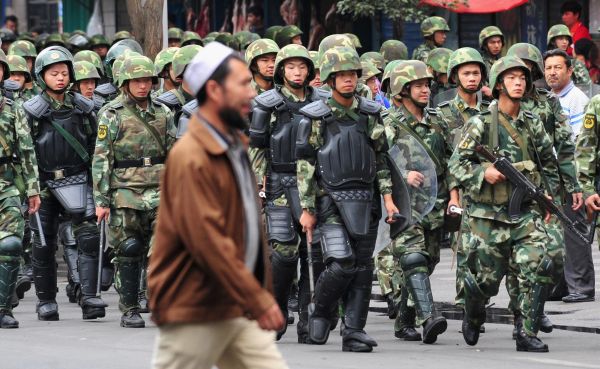
On October 1, the People's Republic of China will mark its 60th anniversary with the largest military parade in its history. The ruling Communist Party is not commemorating 60 years of ideological stability and continuity, however, but a period of speedy change and dramatic reversals.
Most of the major ideas that animate Beijing today are the opposite of those found in Chairman Mao's Little Red Book: Communism as guiding economic doctrine is out. Getting rich is glorious. Western decadence is not threatening, but useful as an engine of China's export economy. And instead of railing against the established powers of the developed world, China now wants to join them.
Still, there is one way in which China's governance philosophy and architecture remain largely unchanged from what Mao Zedong envisioned in the 1950s: minority affairs. And recent bloody riots in Xinjiang and Tibet are a wake-up call that the system is fraying badly. Today Beijing should be encouraging a dialogue about the sources of growing discontent, not placing further bans on local media and minority religious observance, as it is doing now. Rising unrest in China's western borderlands is an ominous sign, not just for Beijing but for all of Asia.
Mao foresaw the challenge of managing minority concerns in western China, but the solution he cooked up was no great leap forward. During China's civil war in the 1940s, he lured China's ethnic minorities -- Tibetans, Uighurs, and Hui Muslims, among others -- into fighting for the Red Army with promises of independence if he prevailed. But once the war ended, Mao retreated from talk of "independence" to talk of "autonomy," borrowing an experimental concept from his northern neighbor, Joseph Stalin.
Today, China's main minority regions, including Xinjiang and Tibet, are technically known as "autonomous regions." These regions, where historically the population has been ethnically and culturally distinct from China's Han majority, have been given the semblance of local stewardship. But decisions are still made centrally, with the assumption that Beijing knows best -- similar to the Soviet system of local satraps who took their orders from Moscow. As Drew Thompson, director of China studies at the Nixon Center in Washington, says, "The phrase 'autonomous regions' rings a little hollow."
With the USSR, of course, the system worked until it didn't: When Mikhail Gorbachev finally took the lid off, it revealed the extent to which Soviet policies had deepened regional and ethnic divisions -- failing at the goal of forging a shared national identity. There's no sign that China will see a happier outcome. "In the long term, this is not a very stable arrangement for China," says the Hudson Institute's Richard Weitz.
It's also not a stable arrangement for any country with a security interest in Central Asia -- which is to say, much of the world. As Weitz explains: "China's two most sensitive ethnic areas are also its two most significant regions for geopolitical reasons: Xinjiang is a Muslim region, and it's very important as China's gateway to Central Asia. And Tibet is a buffer zone for China's tense relationship with India."
Territorial disintegration is the last thing Beijing wants. The leadership is forever wary of the cyclical nature of Chinese history: a millennia-long drama in which political dynasties have risen and amassed territory, until emperors lose the "mandate from heaven" and tumble precipitously -- while the map of China fractures into shards like a shattered vase.
Yet, despite this looming risk, the key principle underlying China's minority policy -- the idea that the Communist Party and the country's political elite are capable of judging for minorities what is in their best interests -- hasn't changed since Mao. Examining that assumption could lead to deeper systemic questioning, which Beijing dearly wants to avoid.
"A fundamental tenet of China's governing philosophy is that the Communist Party leaders are supposed to represent the interests of the country as a whole, without distinction," says Gardner Bovingdon, professor of East Asian and Eurasian studies at Indiana University. "The idea that there could be legitimate sectarian interests, which may have different or even conflicting objectives, is one that the Communist Party does not want to touch." read more>>
***
Related Links
China's Minority Ethnic, Racism and Sensibility Issues
Knot a Problem – China's Lhoba Minority
Is There Really No Racism in China?
Warning:The use of any news and articles published on eChinacities.com without written permission from eChinacities.com constitutes copyright infringement, and legal action can be taken.
All comments are subject to moderation by eChinacities.com staff. Because we wish to encourage healthy and productive dialogue we ask that all comments remain polite, free of profanity or name calling, and relevant to the original post and subsequent discussion. Comments will not be deleted because of the viewpoints they express, only if the mode of expression itself is inappropriate.
Please login to add a comment. Click here to login immediately.